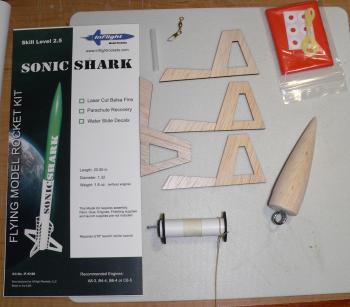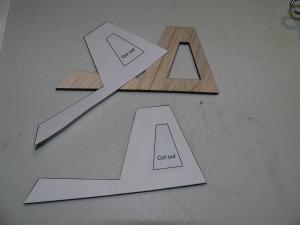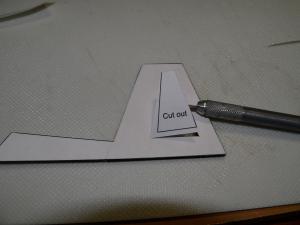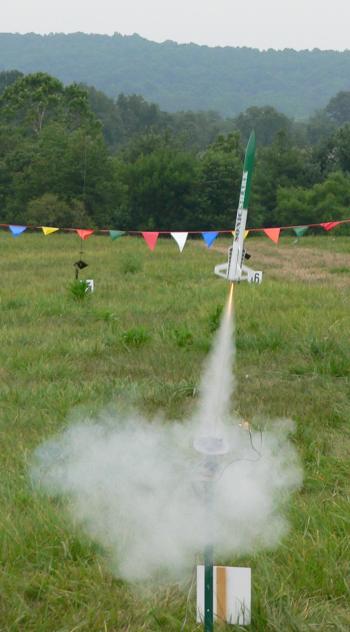| Published: | 2010-11-13 |
| Manufacturer: | InFlight Rockets  |
 (08/04/08) SONIC SHARK: a new release
from InFlight Model Rocketry and my first kit from them. As I've often said, I like trying out new kit manufacturers. I
think over the years it is more to see how ideas and techniques are incorporated into kits. InFlight is relatively new
on the scene and has produced some Clone kits and a couple of their own designs. The Sonic Shark (as stated) is their
newest original design release.
(08/04/08) SONIC SHARK: a new release
from InFlight Model Rocketry and my first kit from them. As I've often said, I like trying out new kit manufacturers. I
think over the years it is more to see how ideas and techniques are incorporated into kits. InFlight is relatively new
on the scene and has produced some Clone kits and a couple of their own designs. The Sonic Shark (as stated) is their
newest original design release.
They say, "The Sonic Shark is an excellent performer with some unique retro styling. Don't go out to the flying field without one!"
I personally don't get the "retro styling" comment, but I'm sure they are referring to the fin shape and holes in the fins. Regardless of whether this is "retro" or not, I like the clean look of the rocket and the presented paint scheme.
The rocket includes a BT55 (1.32") diameter kit and a matching balsa nose cone. There are four laser-cut balsa fins, an 18mm motor mount with a motor hook. The recovery system is made up of an 18" Plastic Parachute (pre-cut), 48" of Kevlar®, 24" of ¼" elastic, and a #5 barrel swivel with snap. The kit includes adhesive paper to cover the fins and 2 decal sheets for the black and the white decals.
CONSTRUCTION:
The instructions are printed on 9 pages of 8½ x 11" paper (both sides). The use clean illustrations and text to detail the build of the rocket. They are well written instructions. There is also a single page with the Model Rocket Safety Code.
 Inflight calls this a Skill Level 2.5 kit. Okay, sure… but
it is not a big stretch for anyone with a few kits under their belts.
Inflight calls this a Skill Level 2.5 kit. Okay, sure… but
it is not a big stretch for anyone with a few kits under their belts.
The build is typical:
The motor mount is built first. The Kevlar® shock tether is attached around the motor tube and passed into the body tube through a slot cut in the upper centering ring. The motor hook is typical and also has a slotted centering ring to allow for easy movement.
Fin preparation includes sanding them all even. Each of the four fins are assembled from two pieces; the forward piece and the trapezoid piece with the "window" cut out of it. The fins are glued together and you are instructed to lay them in-between two heavy books to keep them flat. A unique feature of the kit is to cover both sides with the provided adhesive paper after they dry. (NOTE: the paper provided in my kit had a mistake that InFlight has corrected. All eight of my pieces were for the left side. I had pre-cut them all according to the template before I realized it. As I said, InFlight has corrected).


Attaching the fins is next and that is done in a typical manner. (NOTE: I also had a problem with the fin marking guide. They were not symmetrical: equal spacing between fins. My TOP/BOTTOM fins were not equally spaced from my LEFT/RIGHT fins. Again, InFlight saw this problem and has corrected it).
I guess after those two notes, I should let everyone know that I received one of (if not the) first kit. InFlight was willing to send me all new stuff to make it right, but I made the corrections myself.
The plastic parachute is assembled using the provided shroud lines and tape disks (holes strengtheners). This bright orange parachute assembles just like the Hartle Engineering parachutes.
I followed my normal routine for finishing. This includes multiple coats of Plasti-Kote primer followed by paint. The balsa nose cone took extra coats and sanding, but the fins with the adhesive paper finished nicely.
I painted it with the new Krylon formula and was pleased with the finish of the rocket.
The water-slide decals were thick enough that I didn't damage them and look great on the rocket. Well done here!
Overall, for CONSTRUCTION I would rate this kit 4 points. Build sequence and quality/fit of parts was excellent. Instructions are excellent. I did find a couple of issues that I noted above, but I'm sure if you purchase this kit they will be corrected. Love the decals and the adhesive paper for the fins.
 FLIGHT/RECOVERY:
FLIGHT/RECOVERY:
InFlight recommends the A8-3, B4-4, B6-4 or C6-5 motors.
InFlight indicates that the rocket should weigh 1.8 ounces.
My finished rocket weighed in at 2.3 ounces with a CG at 12.125" from the nose cone. I created the attached RockSIM and SpaceCAD files (top of page) for this rocket based on my results. Both files have a CG and Total Weight Mass Object that you could vary to match your build.
I shipped this rocket to NARAM since I was only going to be there a day or so. This plan included buying motors at the site. When I arrived on Thursday afternoon I was able to buy a pack of C6-5's and the next day a pack of C6-7's to fly this and other rockets.
RockSIM indicates that I should get 731 feet on a C6 with optimal delay of 4.91 seconds, while SpaceCAD says 659 with optimal delay of 4.49 seconds.
The first flight was on a C6-5 and you can see I caught it coming off the pad (nice looking rocket). Lift-off was excellent and the rocket flight was straight up. Ejection was at absolute perfect apogee. The big orange parachute opened and it began its drift. It went pretty far, but landed on the back hill behind the parking area and was recovered.
The next day, using my only remaining motor, I put it up on a C6-7. I knew the delay was long. I also reefed my parachute half way up the shroud lines because everything was drifting out of the launch area. In this case, the longer delay caused ejection to be 1-2 seconds late and the reefed parachute brought the rocket down just 100 paces from the pads. Nice.
I would recommend a smaller parachute or reefing the shroud lines at least half way up.
The Kevlar® shock tether that is attached to the nose cone with a barrel swivel is excellent. No twists. I used cellulose (aka dog-barf, aka insulation) as wadding and it worked great.
For FLIGHT/RECOVERY, I would rate this rocket 4 ½ points. The rocket flies straight and looks good. It gives good altitude, but not out-of-sight flights on C6's, which is a plus in my book. The motor retention and Kevlar® with a swivel make preparation and recovery easy. In my opinion, it needs a smaller parachute but reefing it will resolve that concern.
I give the rocket an OVERALL rating of 4 ½ points. Sporting a unique fin look and having nice decals gives this rocket good looks. If built correctly, it is a solid flier. It is a straightforward build and most rocketeers with any experience should be able to put this one together. Using the adhesive paper to cover the fins while building this kit may move builders to use this technique on other rockets.
 |
 |
Flights
 |
 |